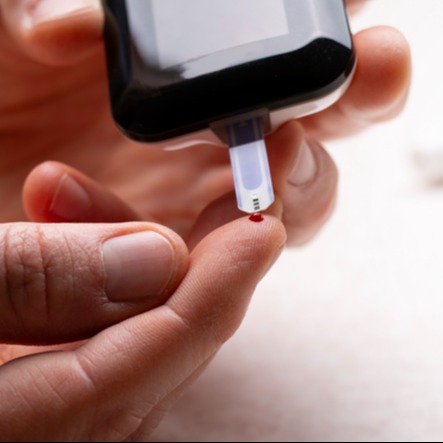
A remarkable group of prescription medications has gained fame for their ability to treat at least two seemingly unrelated medical conditions. Perhaps the most notable example in 2023 was the finding that the diabetes drug Ozempic also led to weight loss in patients. The somewhat complex regulations surrounding pharmaceuticals often lead to the same medication being approved, formulated, and marketed under different names for treating diverse conditions.
This post tells the story of the drug finasteride, which was approved in 1992 for the treatment of benign prostatic hypertrophy (BPH), or enlargement of the prostate. Because the drug blocks the production of testosterone, it was hypothesized that finasteride would affect other conditions. Indeed, by 1997, finasteride was approved for treating male-pattern baldness. There is even evidence that finasteride might help treat opiate addiction.
In February 2024, researchers discovered that finasteride may have an additional beneficial effect: it lowers circulating cholesterol levels and could potentially be used to treat atherosclerotic heart disease.
How Finasteride Works
Finasteride operates by inhibiting the enzyme 5-alpha-reductase, which converts testosterone, the primary male sex hormone, into its more potent form, dihydrotestosterone (DHT). By blocking the action of 5-alpha-reductase, finasteride effectively reduces the body's DHT levels, leading to various physiological changes.
In the context of benign prostatic hyperplasia (BPH), the reduction in DHT levels helps alleviate symptoms by shrinking the enlarged prostate gland, a condition that typically progresses with age due to DHT's influence. This shrinkage improves urinary flow and relieves symptoms such as urinary frequency, urgency, and nocturia. In the case of male pattern baldness, DHT plays a role in miniaturizing hair follicles on the scalp, leading to hair thinning and eventual loss. The inhibition of DHT production by finasteride helps to halt or slow this process, promoting hair regrowth and preventing further hair loss.
Please note that while finasteride has demonstrated efficacy in treating both BPH and male-pattern baldness, its use may be associated with specific side effects, including sexual dysfunction such as decreased libido, erectile dysfunction, and decreased ejaculate volume. These side effects are believed to result from the reduction in DHT levels, which play a role in sexual function. There are also concerns about the potential for long-term adverse effects on sexual health and mood, although the evidence for these risks remains a subject of debate and ongoing research.
A New Application for Finasteride
Atherosclerosis is a condition where fatty substances accumulate inside arteries, leading to heart problems. When cholesterol-rich particles infiltrate artery walls, they trigger reactions that result in the formation of fatty deposits called plaques. These plaques can obstruct arteries or rupture, causing blood clots that may lead to heart attacks and strokes.
Imbalances in certain hormones, such as estrogen and testosterone, can also impact heart health. Estrogen is generally considered protective for both men and women, but the role of testosterone, the primary male hormone, is still under investigation. Testosterone acts on genes in various tissues once it reaches them, and in some tissues, it can be converted to DHT. The precise relationship between testosterone and heart disease is not yet fully understood.
In a study on heart disease, researchers examined how finasteride would affect cholesterol levels. They administered different doses of finasteride to mice to observe its effects. Additionally, they analyzed data from the National Health and Nutrition Examination Survey (NHANES) to determine if individuals taking finasteride experienced changes in their blood fat and sugar levels, known factors affecting heart health.

Finasteride Lowers Cholesterol and Reverses Heart Disease
The researchers discovered that finasteride not only lowered total cholesterol levels in the blood but also slowed the accumulation of fatty deposits in the arteries of mice. They observed that finasteride reduced certain types of white blood cells that contribute to artery blockages, decreased their presence in the artery walls, and diminished the size of damaged areas within the plaques. These damaged areas serve as indicators of plaque instability in humans.
Upon examining the gene expression in the livers of mice treated with finasteride, the investigators noted changes that suggested reduced inflammation and enhanced processing of bile acids and cholesterol. In men who reported using finasteride, levels of blood cholesterol and "bad" LDL-cholesterol were found to be lower compared to those who did not use the drug.
Surprising Findings
When investigators examined the data of men taking finasteride from the NHANES survey, they found that their cholesterol levels were, on average, 30 points lower than those of men not taking the drug. The authors noted that they had initially expected to see the opposite pattern, making the study's findings particularly surprising.
It is crucial for individuals concerned about heart disease to consult with their physicians to discuss lifestyle modifications and potential medical treatments. Heart disease remains a leading cause of death globally, but many risk factors are manageable with the appropriate approach.
First and foremost, patients should openly communicate with their healthcare providers about their concerns, medical history, and any symptoms they may be experiencing. This dialogue forms the foundation for personalized recommendations tailored to the individual's specific needs.
Lifestyle changes play a pivotal role in the prevention and management of heart disease. Patients are encouraged to consult with their healthcare providers about improving their diet, increasing physical activity, quitting smoking, managing stress, and maintaining a healthy weight. These modifications can help lower cholesterol levels, reduce high blood pressure, and enhance overall heart health.
Physicians may recommend specific medical treatments based on the patient's risk factors and health status. These treatments may include medications to control blood pressure, lower cholesterol, or manage diabetes. Patients are encouraged to openly discuss any concerns or potential side effects related to these medications with their physicians.
Regular check-ups and screenings are crucial for monitoring heart health and identifying potential issues early on. Patients should collaborate with their physicians to establish a routine for screenings and follow-up appointments.
Open communication, collaboration, and proactive management are key elements in discussing heart disease prevention and treatment with healthcare providers. By working together, patients and their healthcare providers can develop a comprehensive plan to promote heart health and reduce the risk of cardiovascular events.
Rely on PlanetDrugsDirect.com to Buy Online Hair Loss and Hair Growth Medications
As a trusted prescription referral service, we offer important benefits whenever you order online. Each of our partner pharmacies and/or government-approved dispensaries is committed to providing the best experience possible of any online prescription referral service on the internet. We offer:
Low prices
Quick turn-around times
Generic and brand-name medications
Unparalleled customer service
 Medically reviewed by
Medically reviewed by 





